Unit 8(复习课件)-2023-2024学年五年级英语上册单元速记 巧练(译林版三起)(共60张PPT)
文档属性
| 名称 | Unit 8(复习课件)-2023-2024学年五年级英语上册单元速记 巧练(译林版三起)(共60张PPT) |  | |
| 格式 | pptx | ||
| 文件大小 | 4.7MB | ||
| 资源类型 | 试卷 | ||
| 版本资源 | 牛津译林版 | ||
| 科目 | 英语 | ||
| 更新时间 | 2023-11-17 07:49:21 | ||
图片预览

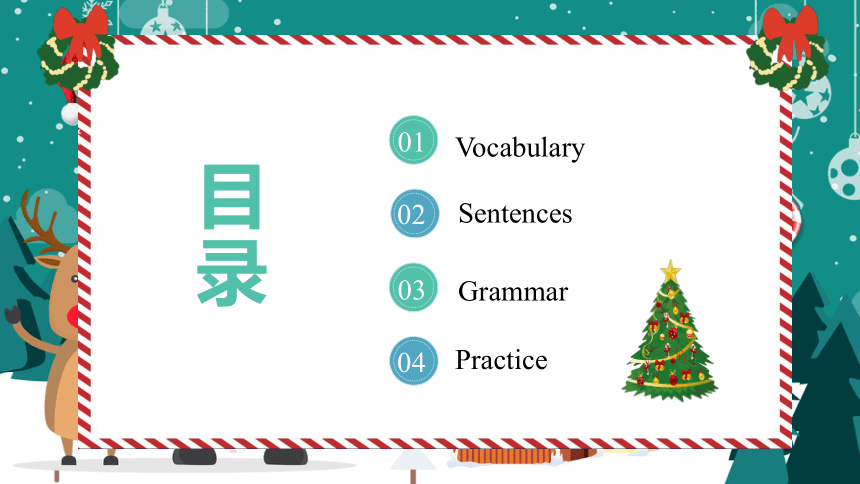
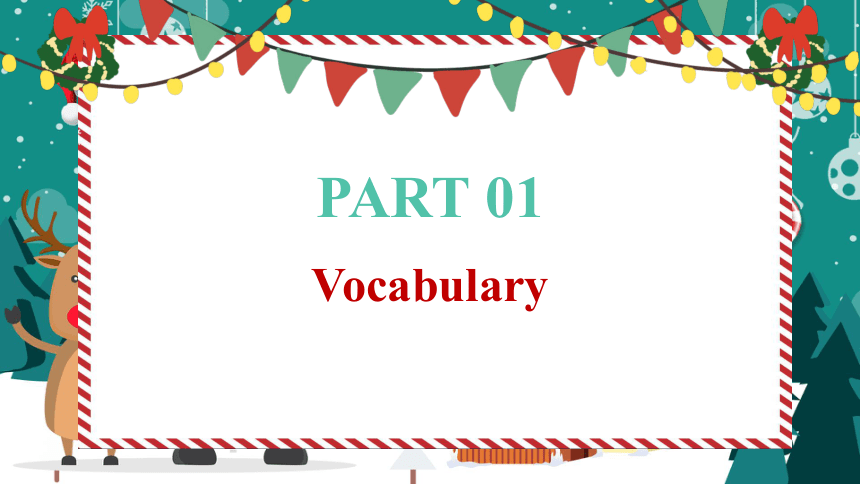
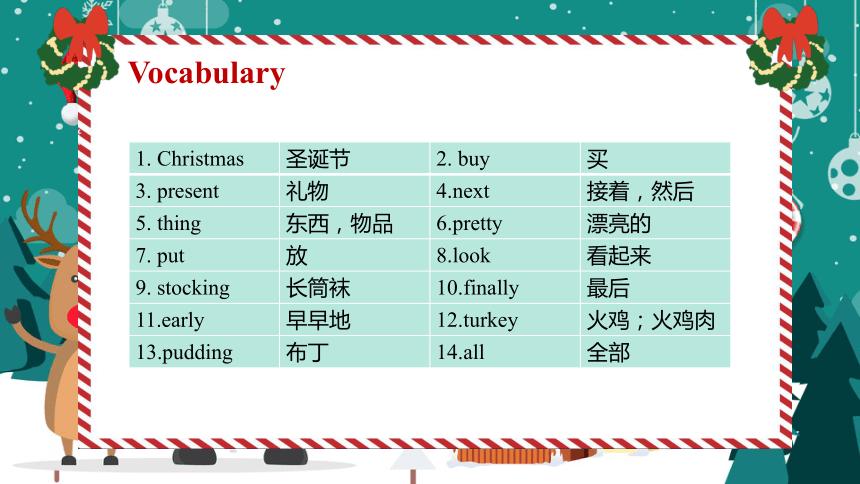
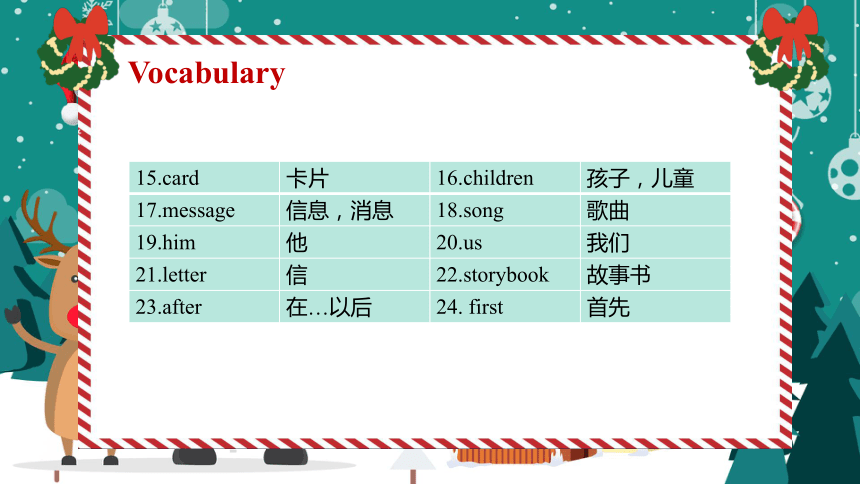
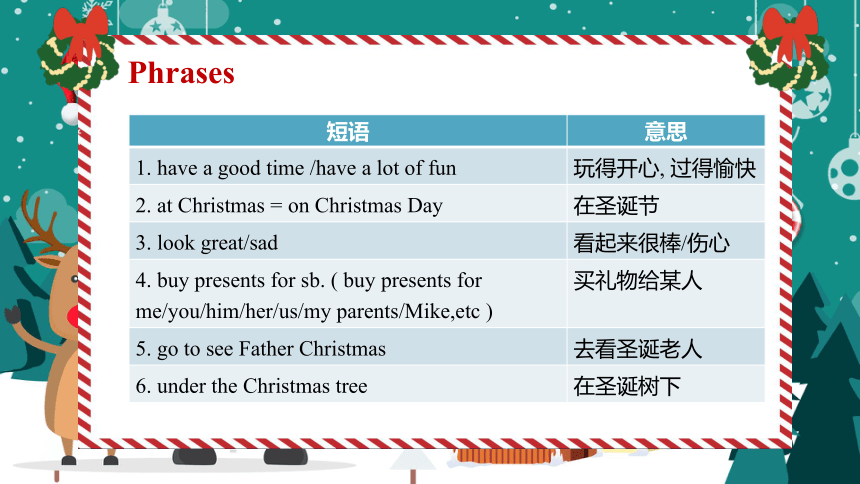
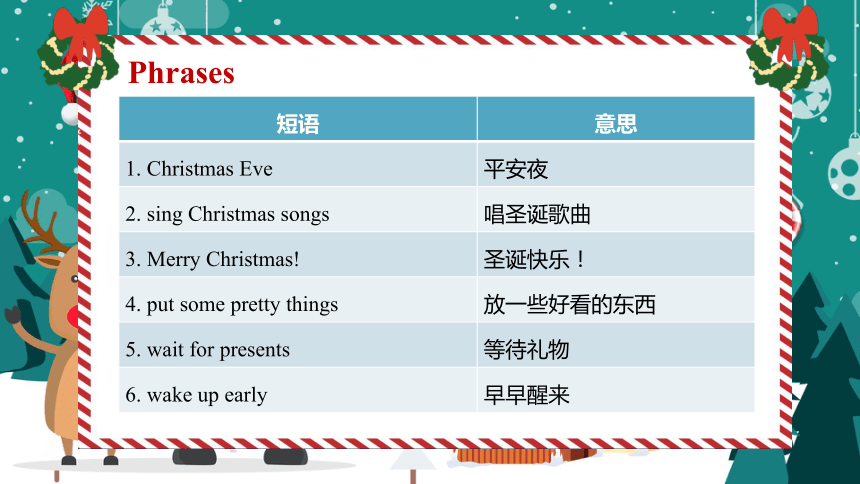
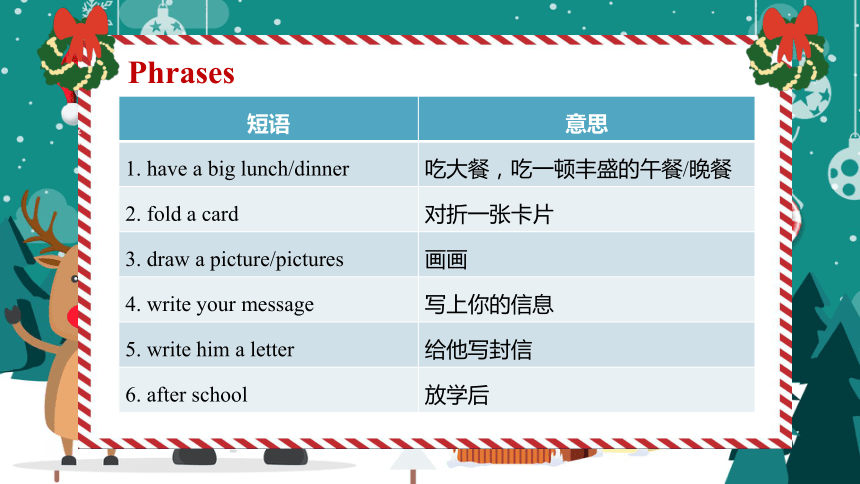
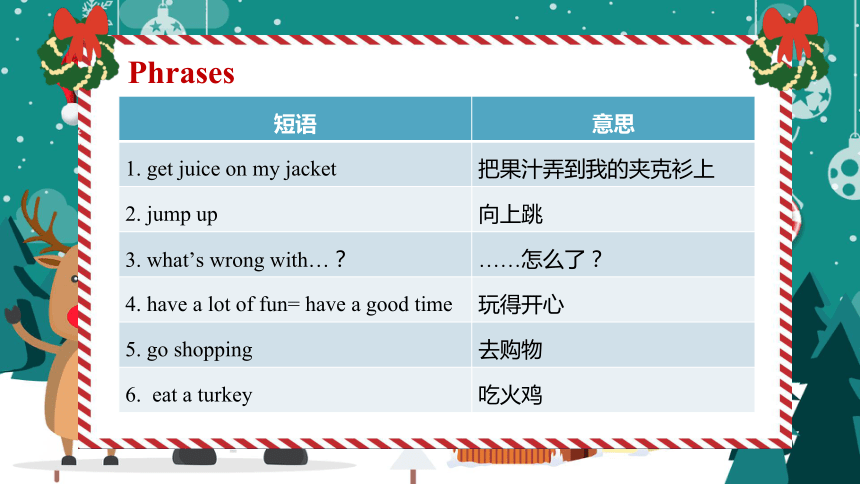
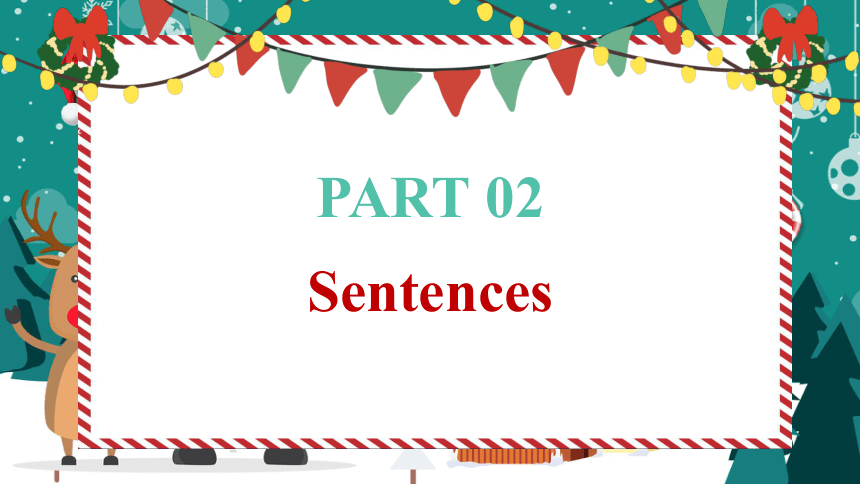
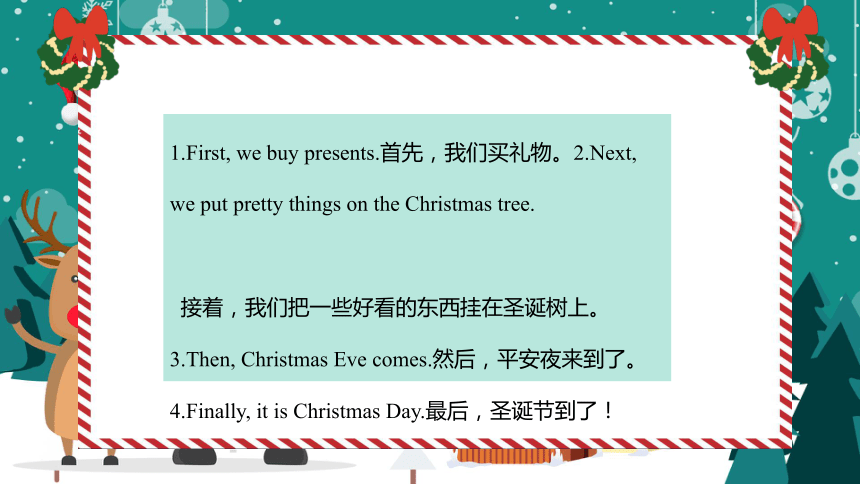
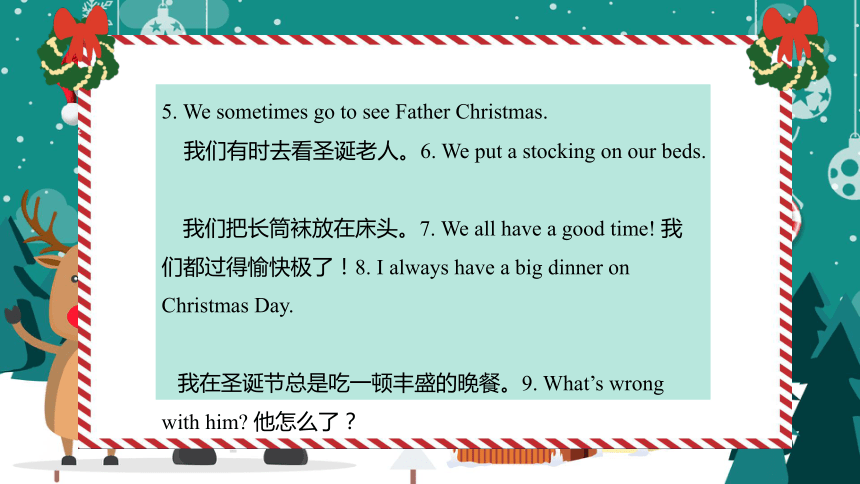
文档简介
(共60张PPT)
译林版五年级上册
Unit 8
At Christmas 复习
目录
01
Vocabulary
02
Sentences
03
Grammar
04
Practice
PART 01
Vocabulary
Vocabulary
1. Christmas 圣诞节 2. buy 买
3. present 礼物 4.next 接着,然后
5. thing 东西,物品 6.pretty 漂亮的
7. put 放 8.look 看起来
9. stocking 长筒袜 10.finally 最后
11.early 早早地 12.turkey 火鸡;火鸡肉
13.pudding 布丁 14.all 全部
Vocabulary
15.card 卡片 16.children 孩子,儿童
17.message 信息,消息 18.song 歌曲
19.him 他 20.us 我们
21.letter 信 22.storybook 故事书
23.after 在…以后 24. first 首先
Phrases
短语 意思
1. have a good time /have a lot of fun 玩得开心, 过得愉快
2. at Christmas = on Christmas Day 在圣诞节
3. look great/sad 看起来很棒/伤心
4. buy presents for sb. ( buy presents for me/you/him/her/us/my parents/Mike,etc ) 买礼物给某人
5. go to see Father Christmas 去看圣诞老人
6. under the Christmas tree 在圣诞树下
Phrases
短语 意思
1. Christmas Eve 平安夜
2. sing Christmas songs 唱圣诞歌曲
3. Merry Christmas! 圣诞快乐!
4. put some pretty things 放一些好看的东西
5. wait for presents 等待礼物
6. wake up early 早早醒来
Phrases
短语 意思
1. have a big lunch/dinner 吃大餐,吃一顿丰盛的午餐/晚餐
2. fold a card 对折一张卡片
3. draw a picture/pictures 画画
4. write your message 写上你的信息
5. write him a letter 给他写封信
6. after school 放学后
Phrases
短语 意思
1. get juice on my jacket 把果汁弄到我的夹克衫上
2. jump up 向上跳
3. what’s wrong with…? ……怎么了?
4. have a lot of fun= have a good time 玩得开心
5. go shopping 去购物
6. eat a turkey 吃火鸡
PART 02
Sentences
1.First, we buy presents.首先,我们买礼物。2.Next, we put pretty things on the Christmas tree.
接着,我们把一些好看的东西挂在圣诞树上。3.Then, Christmas Eve comes.然后,平安夜来到了。4.Finally, it is Christmas Day.最后,圣诞节到了!
5. We sometimes go to see Father Christmas.
我们有时去看圣诞老人。6. We put a stocking on our beds.
我们把长筒袜放在床头。7. We all have a good time! 我们都过得愉快极了!8. I always have a big dinner on Christmas Day.
我在圣诞节总是吃一顿丰盛的晚餐。9. What’s wrong with him 他怎么了?
10.What do you do at Christmas 你圣诞节做什么?11.We wish you a Merry Christmas! 祝你圣诞快乐!
12.We all have a good time! 我们都很开心!
13. -Merry Christmas! Here's a Christmas card for you.
圣诞节快乐!这是给你的卡片。
-Thank you!谢谢!
字母 j 一般在单词中发的音 /d /
jacket juice jump subject
Sounds
At Christmas I always have a lot of fun at christmas. On Christmas Day, There are so many Christmas cards, Christmas trees and many pretty things in the shop.First,I go shopping and buy some presnts for our family and friends with my parents.I also go to see Father Christmas.Next,I make some cards for my friends too.I also sing Christmas songs with my family.Then,I go to the Christmas party.At night, Christmas Eve comes. I put a stocking on my bed and wait for presents.Finally,it is Christmas Day! I open my presents.I have a big dinner with my family. I am very happy on Christmas day!
圣诞活动: 每年的圣诞节大家都过的很愉快,你是怎么度过你的圣诞节呢,请你写一下。不少于50词。
PART 03
Grammar
1. first,next,then,finally 都是表示时间的副词,用来说明事情发生的先后顺序,它们一般放在句首或句末。
First, we buy presents.Next, we put pretty things on the Christmas tree.Then, Christmas Eve comes.Finally, it is Christmas Day.
课文里 first用来说明顺序,意为“先…”,暗示解接下去还有其他动作或事件要发生,因此其后往往接有(或暗示有)then,next,last等词。 first 也可表示序数词,意为“第一”,通常情况下,作为序数词时需要在前面加定冠词the。 介词短语 at first 意为“起初,开始”,它主要用于强调前后对照,暗示接下去的动词与前面的动作不同甚至相反。
have的用法(1)表示“有”的意思。
例:I have a big Christmas tree.(2)表示“用餐”:have+三餐的名称。
例:They have a big dinner on Christmas Day.
have的用法(3)表示“吃;喝”:have+食品或饮料。
例:Have some juice,please.(4)表示“进行;举行”:have+表示某种活动的名称。
例:We sometimes have a picnic at weekends.
双宾
buy presents for+宾格(me/you/him/her/us/my parents/Mike,etc ) 1. buy:用作动词,表示“买”,可带双宾语;
若双宾易位,通常要用介词 for。如:我叔叔为我买了本英语词典。 My uncle buys me an English dictionary.
=My uncle buys an English dictionary for me.
buy sth. for sb. 意为“买某物给某人”,
也可用“buy sb. sth.”,其使用形式为双宾语 结构。make sb. sth = make sth. for sb.give/send/show sb. sth. = give/send/show sth. to sb.
2. 表示向某人买某物,通常用介词 from。
如:He buys this watch from a friend. 他从一位朋友那儿买了这块手表。3. 表示用多少钱买某物,通常用介词 for。如:I buy the computer for $600. 我花600美元买了这台电脑。 He buys it for very little money. 他买它只花了一点点钱。
②have a good time /have a lot of fun time用法: 1. It’s time for 名词 是做……的时候了。 2. It’s time (for sb.) to do sth. 是(某人)该干……的时候了。 3.have a good time /have a lot of fun=enjoy +Ving
We always have a lot of fun at Christmas.
我们在圣诞节总是玩的很开心。① have a lot of fun 意为“玩的很开心”,
其同义短语为“have a good time”,也可以说“have lots of fun”。【拓展】:
fun意为“乐趣,玩笑”,为不可数名词;其形容词形式:funny
② at Christmas 意为“在圣诞节”;
其类似短语有:on Christmas Day 意为“在圣诞节”。
其区别为:
at Christmas 主要强调在圣诞节期间
on Christmas Day 侧重于强调在圣诞节当天
We sometimes go to see Father Christmas.我们有时去看圣诞老人。
sometimes意为“有时”,为频度副词,
常用在一般现在时或一般过去时态中。 always总是 / usually 经常/ often 常常/ sometimes有时,
四个频度副词程度依次递减。
Next, we put some pretty things on the Christmas tree.
接着,我们把一些好看的东西挂在圣诞树上。put sth. on sth. 意为“把…放在…上”;put sth. in sth. 意为“把…放在…里面”;put sth. under sth. 意为“把…放在…下面”;
It looks great.它看上去好看极了。
look的用法:
① 作为不及物动词,意为“看,瞧,望”。常见动词词组有
look at 看一看;look like 看上去像;look after 照顾;
look for 寻找;look forward to 盼望
② look充当系动词,意为“看起来”后可接形容词,名词,过去分词,介词短语等作表语。
Then, Christmas Eve comes. 然后,平安夜到了。Christmas Eve 意为“平安夜”,如表示在平安夜需要用介词on,
即 on Christmas Eve 意为“在平安夜”。【拓展】:除夕 Chinese New Year’s Eve ;
在除夕 on Chinese New Year’s Eve。
We put a stocking on our beds and wait for presents.
我们把一只长筒袜放在床头等待礼物。wait for sth./sb.意为“等待某物/某人”。【拓展】:wait to do sth. 等待做某事 wait for one’s doing 等待做某事 can’t wait to do sth. 迫不及待做某事
We wake up early and open our presents.我们早早醒来,打开礼物。① wake up 意为: 醒来,叫醒。如果后面接的宾语是代词,则要放在中间。 Please wake him up. It’s late for school.② 在此句中early作为副词修饰动词wake;
early也可做形容词,意为“早的”。 I go to school early today.
③ open 作为动词表示“打开”,也可做形容词意为“开着的”。 Please open the door. 【拓展】:close可做动词意为“关闭…”,但如做形容词时表示“亲近的”。 closed作为形容词意为“关着的”。 Don’t close the book. She is close to her friends. The school gate is closed.
You’ll get yourself wet. 你会弄湿你自己的。 yourself 意为“你自己”,为反身代词。
英文 myself yourself himself herself itself themselves ourselves
中文 我自己的 你自己的 他自己的 她自己的 它自己的 他们自己的 我们自己的
英文 my your his her its their our
中文 我的 你的 他的 她的 它的 他们的 我们的
At Christmas, Sam, Bobby and their friends are very happy.
在圣诞节,萨姆,波比和他们的朋友们都很开心。
形容词性物主代词:
What’s wrong with him 他怎么了?“What’s wrong with … ”是询问某人情况的常用语,
其同义句为“What’s the matter with… ”
相应的答句为“I’m / He’s / She’s …”。
I do my homework at five o’clock in the afternoon.
我在晚上六点吃晚饭。① do one’s homework 意为“做家庭作业”其否定句:I don’t do my homework at five o’clock in the afternoon.② at five o’clock 意为“在五点钟”,
在时间点的前面用介词“at”,o’clock仅表示整点。
③ in the afternoon 意为“在下午”; on Monday afternoon 意为“在周一下午” this afternoon 意为“今天下午”,其前不可使用任何介词。
I play the piano at four o’clock in the afternoon.
我在下午四点弹钢琴。 play the piano意为“弹钢琴”;
play + the + 乐器
play + 球类
PART 04
Practice
按要求写出下列单词 1. try(第三人称单数)__________ 2. wash(第三人称单数)__________ 3. up(对应词)__________ 4. left(对应词)__________ 5. me(主格) __________ 6. tooth(复数)__________ 7. fish(复数) __________ 8. students(所有格) __________ 9. eat (现在分词)________ 10.they (宾格) ______________
英汉互译。1. 给他写封信 __________ 2. on Christmas Day __________3. 去购物 __________ 4. have a lot of fun __________5. 吃一顿大餐 __________ 6. write your name __________7. 等待礼物 __________ 8. open presents __________9. 为聚会买东西 __________ 10. Father Christmas __________
写出正确答案。1.We go ____(shop) and see Father Christmas.2.We put some pretty ____(thing) on the Christmas tree.3._____ you good at _____(dance) 4.I like _____(make) cards with my family.5._____(not) jump up, little dog.6.Wang Bing usually _____(visit) his grandparents on Saturdays.7.____(final), they go home together.
用所给词的适当形式填空。 1. People eat _________ (we) on Christmas Day.2. The girl _______ (look) sad.3. She _______(not like) _______(eat) pudding.4. Mike usually _____(buy) pretty things and ______(put) them on the tree.5. What’s wrong with ______ (he) He can’t find _______(he) book.6. On New Year’s Day, _______(child) always send presents to each other.7. Don’t_______ (jump) up, little dog! You will get juice on my jacket.
单项选择。( ) 1.We always ___________ a lot of __________ at Christmas. A. have ; funs B. has ; fun C. have ; fun( ) 2.There aren’t _________ presents under the Christmas tree. A. some B. any C. an( ) 3. Mike ______ them ________ our friends . A. buy ; to B. buys ; to C. buys; for
( ) 4. Father Christmas _________ an old man. A. be B. is C. are( ) 5. There __________ a pen and two pencils in the pencil case. A. are B. is C. be( ) 6. People can _________ a big lunch at Christmas. A. having B. to have C. have
( ) 7. The girl _______ a nice lunch ________ Christmas. A. have ; on B. has ; on C. has ; at( ) 8. We’d like __________ some presents for the children. A. buying B. to buy C. to buying( ) 9. We often buy presents ________ our parents. A. to B. for C. at( ) 10. I always have lunch ________ my family New Year’s Day. A. and at B. with on C. for on
根据汉语提示完成句子。1. 我们为家人买礼物。We ________ presents for our ________.2. 他们也有一棵圣诞树。They ________ have a Christmas ________ .3. 有时候我们去看圣诞老人。Sometimes we ________ to ________ Father Christmas.
根据汉语提示完成句子。4. 孩子们把一些漂亮的东西放在圣诞树上。The ________ put some pretty things ________ the Christmas tree.5. 能见到圣诞老人真的很好玩。It is ________ ________ to see Father Christmas.
按要求改写句子。1.They have a big dinner at Christmas.(改为一般疑问句)_________ they __________ a big dinner at Christmas 2. Children put a stocking on the beds. (对划线部分提问)__________ ____________ children __________ on the beds 3. He looks sad. (改为否定句)He ________ __________ sad.
按要求改写句子。4. goes, sometimes ,Sam ,see ,to ,his grandparents.(连词成句)_______________________________________________________5、early, open, up , presents , and , wake , my , I. (连词成句)________________________________________________________
改错。( )1. We have a lot of funny at Christmas. ______________ A B C ( )2. What do you do at Christmas Day _______________ A B C ( )3. His mother usually fly kites on Sunday. _______________ A B C ( ) 4. Then, write you message on the card. _______________ A B C
在II栏中找出I栏相应的答句。 I II ( )1、What do you have A、She is playing the piano.( )2、Are Su Hai and Su Yang over there B、He has a new bike. ( )3、Is your mother a teacher C、No, they aren’t. ( )4、What’s the girl doing D、Yes, she is. ( )5、What does Mike have E、I have a toy plane.
Sam is an American boy. He’s twelve years old. His parents work in Shanghai. So Jim came to Shanghai in August. Now he studies in a primary school in Shanghai. His father took him and his mother to a Chinese friend’s house at Mid-Autumn Festival. They had a wonderful time together. Sam thought of (想起) Thanksgiving Day in his country. It is a traditional(传统的) festival in America. It’s on the fourth Thursday of November. On that day, people give thanks to God for giving them a good harvest(丰收). It’s usually a family day. Family members get together and eat a lot. A big turkey and some pumpkin (南瓜) pies are their special(特别的) food for the festival.
判断对错,对写T, 错写F( )1. Sam comes from the UK.( )2. Sam had a Mid-Autumn Festival at school.( )3. The Chinese for “Thanksgiving Day” is 感恩节。( )4. Thanksgiving Day is on the 24th of November.( )5. American people usually eat turkeys and pumpkin pies on Thanksgiving Day.
Hello, I’m John. I’m an Australian boy. I study in Shanghai. I like China very much and now I know a lot about China. Spring Festival (春节) is Chinese festival. It is different from our Australian New Year. There are 12 different names for each (每) year. They are the year of monkey, the year of dog, the year of tiger… Before (在……之前) Spring Festival, Chinese people are busy shopping and cleaning. On the New Year’ s Eve, there is a big family dinner. They usually eat dumplings (饺子). After dinner, the family stay up late (守夜) to welcome Chinese New Year. On the first day of Spring Festival, they wear new clothes to visit their relatives (亲戚) and say “Happy New Year” to each other. I like Spring Festival.
( )1. John is from___________. A. the UK B. the US C. Australia ( )2. There are_______different names for Chinese years. A. ten B. twelve C. twenty( )3. Chinese New Year’s Eve is the_______Spring Festival . A. morning before B. evening before C. evening after
( )4. Chinese people_______before Spring Festival. A. sing and dance B. eat dumplings
C. go shopping and clean the house( )5. Spring Festival and Australian New Year are ____________. A. the same B. on the same day C. different
Thank you!
译林版五年级上册
Unit 8
At Christmas 复习
目录
01
Vocabulary
02
Sentences
03
Grammar
04
Practice
PART 01
Vocabulary
Vocabulary
1. Christmas 圣诞节 2. buy 买
3. present 礼物 4.next 接着,然后
5. thing 东西,物品 6.pretty 漂亮的
7. put 放 8.look 看起来
9. stocking 长筒袜 10.finally 最后
11.early 早早地 12.turkey 火鸡;火鸡肉
13.pudding 布丁 14.all 全部
Vocabulary
15.card 卡片 16.children 孩子,儿童
17.message 信息,消息 18.song 歌曲
19.him 他 20.us 我们
21.letter 信 22.storybook 故事书
23.after 在…以后 24. first 首先
Phrases
短语 意思
1. have a good time /have a lot of fun 玩得开心, 过得愉快
2. at Christmas = on Christmas Day 在圣诞节
3. look great/sad 看起来很棒/伤心
4. buy presents for sb. ( buy presents for me/you/him/her/us/my parents/Mike,etc ) 买礼物给某人
5. go to see Father Christmas 去看圣诞老人
6. under the Christmas tree 在圣诞树下
Phrases
短语 意思
1. Christmas Eve 平安夜
2. sing Christmas songs 唱圣诞歌曲
3. Merry Christmas! 圣诞快乐!
4. put some pretty things 放一些好看的东西
5. wait for presents 等待礼物
6. wake up early 早早醒来
Phrases
短语 意思
1. have a big lunch/dinner 吃大餐,吃一顿丰盛的午餐/晚餐
2. fold a card 对折一张卡片
3. draw a picture/pictures 画画
4. write your message 写上你的信息
5. write him a letter 给他写封信
6. after school 放学后
Phrases
短语 意思
1. get juice on my jacket 把果汁弄到我的夹克衫上
2. jump up 向上跳
3. what’s wrong with…? ……怎么了?
4. have a lot of fun= have a good time 玩得开心
5. go shopping 去购物
6. eat a turkey 吃火鸡
PART 02
Sentences
1.First, we buy presents.首先,我们买礼物。2.Next, we put pretty things on the Christmas tree.
接着,我们把一些好看的东西挂在圣诞树上。3.Then, Christmas Eve comes.然后,平安夜来到了。4.Finally, it is Christmas Day.最后,圣诞节到了!
5. We sometimes go to see Father Christmas.
我们有时去看圣诞老人。6. We put a stocking on our beds.
我们把长筒袜放在床头。7. We all have a good time! 我们都过得愉快极了!8. I always have a big dinner on Christmas Day.
我在圣诞节总是吃一顿丰盛的晚餐。9. What’s wrong with him 他怎么了?
10.What do you do at Christmas 你圣诞节做什么?11.We wish you a Merry Christmas! 祝你圣诞快乐!
12.We all have a good time! 我们都很开心!
13. -Merry Christmas! Here's a Christmas card for you.
圣诞节快乐!这是给你的卡片。
-Thank you!谢谢!
字母 j 一般在单词中发的音 /d /
jacket juice jump subject
Sounds
At Christmas I always have a lot of fun at christmas. On Christmas Day, There are so many Christmas cards, Christmas trees and many pretty things in the shop.First,I go shopping and buy some presnts for our family and friends with my parents.I also go to see Father Christmas.Next,I make some cards for my friends too.I also sing Christmas songs with my family.Then,I go to the Christmas party.At night, Christmas Eve comes. I put a stocking on my bed and wait for presents.Finally,it is Christmas Day! I open my presents.I have a big dinner with my family. I am very happy on Christmas day!
圣诞活动: 每年的圣诞节大家都过的很愉快,你是怎么度过你的圣诞节呢,请你写一下。不少于50词。
PART 03
Grammar
1. first,next,then,finally 都是表示时间的副词,用来说明事情发生的先后顺序,它们一般放在句首或句末。
First, we buy presents.Next, we put pretty things on the Christmas tree.Then, Christmas Eve comes.Finally, it is Christmas Day.
课文里 first用来说明顺序,意为“先…”,暗示解接下去还有其他动作或事件要发生,因此其后往往接有(或暗示有)then,next,last等词。 first 也可表示序数词,意为“第一”,通常情况下,作为序数词时需要在前面加定冠词the。 介词短语 at first 意为“起初,开始”,它主要用于强调前后对照,暗示接下去的动词与前面的动作不同甚至相反。
have的用法(1)表示“有”的意思。
例:I have a big Christmas tree.(2)表示“用餐”:have+三餐的名称。
例:They have a big dinner on Christmas Day.
have的用法(3)表示“吃;喝”:have+食品或饮料。
例:Have some juice,please.(4)表示“进行;举行”:have+表示某种活动的名称。
例:We sometimes have a picnic at weekends.
双宾
buy presents for+宾格(me/you/him/her/us/my parents/Mike,etc ) 1. buy:用作动词,表示“买”,可带双宾语;
若双宾易位,通常要用介词 for。如:我叔叔为我买了本英语词典。 My uncle buys me an English dictionary.
=My uncle buys an English dictionary for me.
buy sth. for sb. 意为“买某物给某人”,
也可用“buy sb. sth.”,其使用形式为双宾语 结构。make sb. sth = make sth. for sb.give/send/show sb. sth. = give/send/show sth. to sb.
2. 表示向某人买某物,通常用介词 from。
如:He buys this watch from a friend. 他从一位朋友那儿买了这块手表。3. 表示用多少钱买某物,通常用介词 for。如:I buy the computer for $600. 我花600美元买了这台电脑。 He buys it for very little money. 他买它只花了一点点钱。
②have a good time /have a lot of fun time用法: 1. It’s time for 名词 是做……的时候了。 2. It’s time (for sb.) to do sth. 是(某人)该干……的时候了。 3.have a good time /have a lot of fun=enjoy +Ving
We always have a lot of fun at Christmas.
我们在圣诞节总是玩的很开心。① have a lot of fun 意为“玩的很开心”,
其同义短语为“have a good time”,也可以说“have lots of fun”。【拓展】:
fun意为“乐趣,玩笑”,为不可数名词;其形容词形式:funny
② at Christmas 意为“在圣诞节”;
其类似短语有:on Christmas Day 意为“在圣诞节”。
其区别为:
at Christmas 主要强调在圣诞节期间
on Christmas Day 侧重于强调在圣诞节当天
We sometimes go to see Father Christmas.我们有时去看圣诞老人。
sometimes意为“有时”,为频度副词,
常用在一般现在时或一般过去时态中。 always总是 / usually 经常/ often 常常/ sometimes有时,
四个频度副词程度依次递减。
Next, we put some pretty things on the Christmas tree.
接着,我们把一些好看的东西挂在圣诞树上。put sth. on sth. 意为“把…放在…上”;put sth. in sth. 意为“把…放在…里面”;put sth. under sth. 意为“把…放在…下面”;
It looks great.它看上去好看极了。
look的用法:
① 作为不及物动词,意为“看,瞧,望”。常见动词词组有
look at 看一看;look like 看上去像;look after 照顾;
look for 寻找;look forward to 盼望
② look充当系动词,意为“看起来”后可接形容词,名词,过去分词,介词短语等作表语。
Then, Christmas Eve comes. 然后,平安夜到了。Christmas Eve 意为“平安夜”,如表示在平安夜需要用介词on,
即 on Christmas Eve 意为“在平安夜”。【拓展】:除夕 Chinese New Year’s Eve ;
在除夕 on Chinese New Year’s Eve。
We put a stocking on our beds and wait for presents.
我们把一只长筒袜放在床头等待礼物。wait for sth./sb.意为“等待某物/某人”。【拓展】:wait to do sth. 等待做某事 wait for one’s doing 等待做某事 can’t wait to do sth. 迫不及待做某事
We wake up early and open our presents.我们早早醒来,打开礼物。① wake up 意为: 醒来,叫醒。如果后面接的宾语是代词,则要放在中间。 Please wake him up. It’s late for school.② 在此句中early作为副词修饰动词wake;
early也可做形容词,意为“早的”。 I go to school early today.
③ open 作为动词表示“打开”,也可做形容词意为“开着的”。 Please open the door. 【拓展】:close可做动词意为“关闭…”,但如做形容词时表示“亲近的”。 closed作为形容词意为“关着的”。 Don’t close the book. She is close to her friends. The school gate is closed.
You’ll get yourself wet. 你会弄湿你自己的。 yourself 意为“你自己”,为反身代词。
英文 myself yourself himself herself itself themselves ourselves
中文 我自己的 你自己的 他自己的 她自己的 它自己的 他们自己的 我们自己的
英文 my your his her its their our
中文 我的 你的 他的 她的 它的 他们的 我们的
At Christmas, Sam, Bobby and their friends are very happy.
在圣诞节,萨姆,波比和他们的朋友们都很开心。
形容词性物主代词:
What’s wrong with him 他怎么了?“What’s wrong with … ”是询问某人情况的常用语,
其同义句为“What’s the matter with… ”
相应的答句为“I’m / He’s / She’s …”。
I do my homework at five o’clock in the afternoon.
我在晚上六点吃晚饭。① do one’s homework 意为“做家庭作业”其否定句:I don’t do my homework at five o’clock in the afternoon.② at five o’clock 意为“在五点钟”,
在时间点的前面用介词“at”,o’clock仅表示整点。
③ in the afternoon 意为“在下午”; on Monday afternoon 意为“在周一下午” this afternoon 意为“今天下午”,其前不可使用任何介词。
I play the piano at four o’clock in the afternoon.
我在下午四点弹钢琴。 play the piano意为“弹钢琴”;
play + the + 乐器
play + 球类
PART 04
Practice
按要求写出下列单词 1. try(第三人称单数)__________ 2. wash(第三人称单数)__________ 3. up(对应词)__________ 4. left(对应词)__________ 5. me(主格) __________ 6. tooth(复数)__________ 7. fish(复数) __________ 8. students(所有格) __________ 9. eat (现在分词)________ 10.they (宾格) ______________
英汉互译。1. 给他写封信 __________ 2. on Christmas Day __________3. 去购物 __________ 4. have a lot of fun __________5. 吃一顿大餐 __________ 6. write your name __________7. 等待礼物 __________ 8. open presents __________9. 为聚会买东西 __________ 10. Father Christmas __________
写出正确答案。1.We go ____(shop) and see Father Christmas.2.We put some pretty ____(thing) on the Christmas tree.3._____ you good at _____(dance) 4.I like _____(make) cards with my family.5._____(not) jump up, little dog.6.Wang Bing usually _____(visit) his grandparents on Saturdays.7.____(final), they go home together.
用所给词的适当形式填空。 1. People eat _________ (we) on Christmas Day.2. The girl _______ (look) sad.3. She _______(not like) _______(eat) pudding.4. Mike usually _____(buy) pretty things and ______(put) them on the tree.5. What’s wrong with ______ (he) He can’t find _______(he) book.6. On New Year’s Day, _______(child) always send presents to each other.7. Don’t_______ (jump) up, little dog! You will get juice on my jacket.
单项选择。( ) 1.We always ___________ a lot of __________ at Christmas. A. have ; funs B. has ; fun C. have ; fun( ) 2.There aren’t _________ presents under the Christmas tree. A. some B. any C. an( ) 3. Mike ______ them ________ our friends . A. buy ; to B. buys ; to C. buys; for
( ) 4. Father Christmas _________ an old man. A. be B. is C. are( ) 5. There __________ a pen and two pencils in the pencil case. A. are B. is C. be( ) 6. People can _________ a big lunch at Christmas. A. having B. to have C. have
( ) 7. The girl _______ a nice lunch ________ Christmas. A. have ; on B. has ; on C. has ; at( ) 8. We’d like __________ some presents for the children. A. buying B. to buy C. to buying( ) 9. We often buy presents ________ our parents. A. to B. for C. at( ) 10. I always have lunch ________ my family New Year’s Day. A. and at B. with on C. for on
根据汉语提示完成句子。1. 我们为家人买礼物。We ________ presents for our ________.2. 他们也有一棵圣诞树。They ________ have a Christmas ________ .3. 有时候我们去看圣诞老人。Sometimes we ________ to ________ Father Christmas.
根据汉语提示完成句子。4. 孩子们把一些漂亮的东西放在圣诞树上。The ________ put some pretty things ________ the Christmas tree.5. 能见到圣诞老人真的很好玩。It is ________ ________ to see Father Christmas.
按要求改写句子。1.They have a big dinner at Christmas.(改为一般疑问句)_________ they __________ a big dinner at Christmas 2. Children put a stocking on the beds. (对划线部分提问)__________ ____________ children __________ on the beds 3. He looks sad. (改为否定句)He ________ __________ sad.
按要求改写句子。4. goes, sometimes ,Sam ,see ,to ,his grandparents.(连词成句)_______________________________________________________5、early, open, up , presents , and , wake , my , I. (连词成句)________________________________________________________
改错。( )1. We have a lot of funny at Christmas. ______________ A B C ( )2. What do you do at Christmas Day _______________ A B C ( )3. His mother usually fly kites on Sunday. _______________ A B C ( ) 4. Then, write you message on the card. _______________ A B C
在II栏中找出I栏相应的答句。 I II ( )1、What do you have A、She is playing the piano.( )2、Are Su Hai and Su Yang over there B、He has a new bike. ( )3、Is your mother a teacher C、No, they aren’t. ( )4、What’s the girl doing D、Yes, she is. ( )5、What does Mike have E、I have a toy plane.
Sam is an American boy. He’s twelve years old. His parents work in Shanghai. So Jim came to Shanghai in August. Now he studies in a primary school in Shanghai. His father took him and his mother to a Chinese friend’s house at Mid-Autumn Festival. They had a wonderful time together. Sam thought of (想起) Thanksgiving Day in his country. It is a traditional(传统的) festival in America. It’s on the fourth Thursday of November. On that day, people give thanks to God for giving them a good harvest(丰收). It’s usually a family day. Family members get together and eat a lot. A big turkey and some pumpkin (南瓜) pies are their special(特别的) food for the festival.
判断对错,对写T, 错写F( )1. Sam comes from the UK.( )2. Sam had a Mid-Autumn Festival at school.( )3. The Chinese for “Thanksgiving Day” is 感恩节。( )4. Thanksgiving Day is on the 24th of November.( )5. American people usually eat turkeys and pumpkin pies on Thanksgiving Day.
Hello, I’m John. I’m an Australian boy. I study in Shanghai. I like China very much and now I know a lot about China. Spring Festival (春节) is Chinese festival. It is different from our Australian New Year. There are 12 different names for each (每) year. They are the year of monkey, the year of dog, the year of tiger… Before (在……之前) Spring Festival, Chinese people are busy shopping and cleaning. On the New Year’ s Eve, there is a big family dinner. They usually eat dumplings (饺子). After dinner, the family stay up late (守夜) to welcome Chinese New Year. On the first day of Spring Festival, they wear new clothes to visit their relatives (亲戚) and say “Happy New Year” to each other. I like Spring Festival.
( )1. John is from___________. A. the UK B. the US C. Australia ( )2. There are_______different names for Chinese years. A. ten B. twelve C. twenty( )3. Chinese New Year’s Eve is the_______Spring Festival . A. morning before B. evening before C. evening after
( )4. Chinese people_______before Spring Festival. A. sing and dance B. eat dumplings
C. go shopping and clean the house( )5. Spring Festival and Australian New Year are ____________. A. the same B. on the same day C. different
Thank you!
